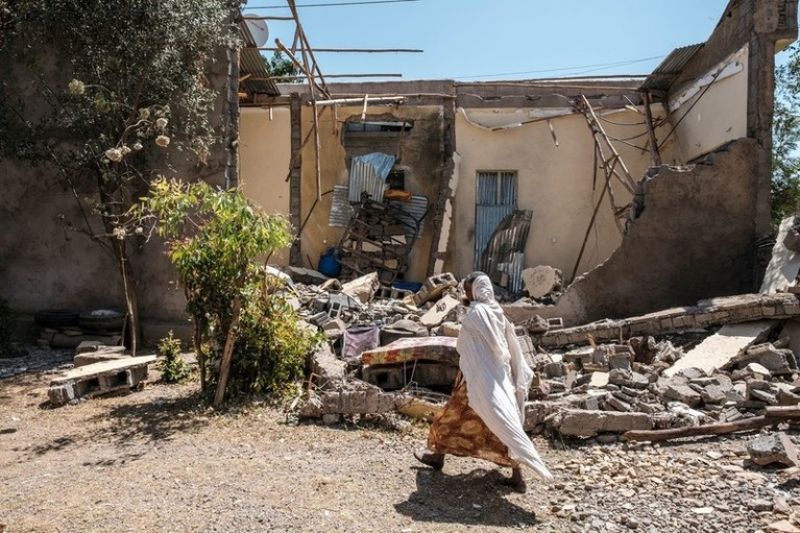Witnesses and aid workers claim that despite a truce between the Ethiopian government and opposition local forces, the allies of the Ethiopian military are robbing people of their possessions.

Witnesses and aid workers claim that despite a truce between the Ethiopian government and opposition local forces, the allies of the Ethiopian military are robbing people of their possessions.
They are also holding large numbers of people in Tigray. Three weeks after, the warring parties agreed to a cease-fire.
Witnesses claim that despite a cease-fire, kidnappings, violence, and looting are still occurring in Tigray, Ethiopia.
Diplomats and others hoped the agreement would end the suffering in the troubled region, which is a shelter to more than 5 million people. Instead, the accounts raise fresh concerns about alleged atrocities.
Although aid deliveries to the region resumed following the truce agreement signed in South Africa on November 2, Tigray is still far away from the rest of Ethiopia.
As a result, human rights researchers have little to no access to the area. This makes it challenging for journalists and others to gather information as Ethiopian forces continue asserting control.
Armed forces from neighboring Ethiopian regions Amhara and Eritrea have been fighting alongside Ethiopian forces in the Tigray conflict. Eritrea and Tigray share a border.
Two aid workers in Shire, a northwest town taken from Tigray forces last month, told the Associated Press on the condition of anonymity. They stated that they had looted shops, private properties, cars, and medical equipment clinics due to security reasons.

The aid workers reported that Eritrean troops in Shire had abducted several young people.
One witness claimed to have witnessed "more than 300" youths being apprehended by Ethiopian forces in several waves of mass detentions following the capture of Shire, the location of a sizable internal displacement population.
According to the aid worker, Ethiopian troops were detaining people they suspected of being "associated" with the Tigray People's Liberation Front, or TPLF.
TPLF is a political party whose leaders waged war against the federal government. "There are various detention centers around town," the aid worker explained.
According to a local of the southern town of Alamata, Amhara forces have detained several of his friends. In addition, they are holding civilians accused of aiding Tigray forces there.
According to a former regional official, Amhara forces are also making "mass" arrests in the rural areas near the town of Korem, about 12 miles north of Alamata.
To protect their safety and avoid retaliation, the Alamata resident and the former regional official, like some other people who spoke to the AP, asked to remain anonymous.
The U.S. has called for removing Eritrean troops from the area because their continued presence in Tigray continues to be a contentious issue in the ongoing peace process.
Ethiopia's military spokesperson and communications minister ignored a request for comment. The Ethiopian embassy in Eritrea also didn't reply.
The cease-fire agreement's text made no mention of Eritrea.
The country's repressive government, which has long viewed the Tigray authorities as a threat, had been absent from the cease-fire negotiations, raising concerns about its ability to uphold the agreement.
Following the withdrawal of foreign and non-[federal] forces from the area, the Tigray forces will disarm their heavy weapons, according to an implementation agreement signed by military leaders in Kenya.
However, aid workers, diplomats, and others in Tigray claim that Eritrean forces are still present in several regions of the country, harming the peace process.
In addition, some worst abuses that occurred during the conflict, like gang rapes, have been attributed to Eritrean forces.
An area called Egela in central Tigray had been the scene of 63 civilian deaths by Eritrean soldiers, including ten children, according to Tigrai Television, a local broadcaster based in Mekele, the capital of Tigray.
Witnesses also claimed that affected communities were being hindered from burying their dead.
The importance of implementing the peace agreement, "including the concurrent disarmament of the Tigray forces and withdrawal of all foreign forces," was discussed on the phone between American Secretary of State Antony J. Blinken and Prime Minister of Ethiopia Abiy Ahmed.
On November 17, a humanitarian worker informed the Associated Press that Eritrean forces in the northwest Tigray town of Axum had killed four youths. The killings continue despite the peace agreement, and only Eritrean forces are engaged in carrying it out in Axum," the aid worker said.
Tigray's communication bureau last week stated that Eritrea's military continues committing horrific atrocities in Tigray. Despite the cease-fire agreement, it was claimed in that statement that Eritrean President Isaias Afwerki "is involving more units into Tigray."
After months of a lull, Tigray's brutal fighting broke out in August after spilling over into the Amhara and Afar regions as Tigray forces advanced on the Ethiopian capital of Addis Abeba last year.
Two years of restrictions on aid have left Tigray amid a severe humanitarian crisis. In addition, a United Nations panel concluded that Ethiopia's government most likely used starvation as a method of warfare to attack its adversaries in the region due to these restrictions.
Tigray civilians are not being targeted, according to Ethiopian authorities, who claim their objective is to capture the rebel leaders in the area. However, despite the cease-fire, basic services like phone, electricity, and banking are still unavailable in most Tigray.
According to the terms of the cease-fire agreement, Ethiopian authorities must permit "unrestricted humanitarian access" to Tigray.96 food and fuel trucks have been sent to Tigray since the agreement, according to the World Food Program.
However, access to some areas of central and eastern Tigray is still "constrained." Unrestricted access to Tigray is still pending, a Friday aid worker reported.
According to the aid worker, The amount of money that humanitarian organizations are permitted to bring into Tigray is restricted. In addition, checkpoints and military leaders obstruct aid workers' movements within the area.

